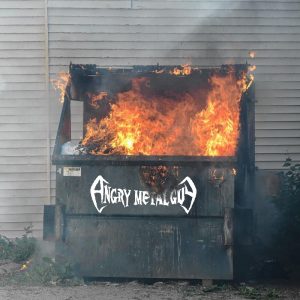The life of the unpaid, overworked metal reviewer is not an easy one. Cascading promos, unreasonable deadlines, draconian editors, and the unwashed metal mobs – it makes for a swirling maelstrom of music and madness. In all that tumult, errors are bound to happen and sometimes our initial impression of an album may not be completely accurate. With time and distance comes wisdom, and so we’ve decided to pull back the confessional curtain and reveal our biggest blunders, missteps, oversights and ratings face-plants. Consider this our sincere AMGea culpa. Redemption is retroactive, forgiveness is mandatory.
As those of us who follow the Gregorian calendar and partake in Judeo/Christian cultural traditions prepare to face the final bosses of the holiday season, we experience a wide range of feelings. Anticipation, at the prospect of gorging on holiday treats as we shuffle from one party to another thrown by family and friends. Nostalgia, of course, as we uphold our traditions and reflect on the celebrations of yesteryear. And, for those who write music reviews for a non-living, contrition. Intense embarrassment and remorse as we prepare for Listurnalia, revisiting records we thought we had judicated accurately only to discover the depth of our wrongheadedness. Sometimes our self-reproach has nothing to do with impending lists. Sometimes, shortly after writing a review, an ember of doubt will ignite, smoldering just under our calm exteriors, growing until we want to shriek “Dissemble no more! I admit the deed! — tear up the planks! — here, here! — it is the beating of his hideous heart!” It’s been over three years since the last time we unloaded our disgrace onto you, the unsuspecting reader, so expect this to be a long self-flagellation session.
– Cherd
Carcharodon
Verses in contrition
Earlier this year, I described Hulder’s Verses in Oath as spellbinding, going on to ward it a lofty 4.5. I’ve taken a fair amount of stick for that in the months since, both in the comments and round the staffroom feeding trough. And while that’s fine—you’ve all been wrong before and I have absolutely no doubt you’ll all be wrong again—it’s only fair that such consistent criticism should cause me to reflect a little. And reflect I have. Now, it’s true that, as I said in my review, Verses in Oath is dark and vicious, but also haunting and ethereal. But it’s also true that, although well executed, it lacks true originality and I got carried away. It happens. I loved all the constituent elements of the record and I still think that they are woven together with skill and good songcraft. However, it’s not an album I’ve returned to as much as I thought I would and (spoilers!) it’s not going to make my year end list. Which makes it rather hard to defend the 4.5 any longer. So I won’t. It’s a very good album but no more than that.
Original score: 4.5
Adjusted score: 3.5
We came here to apologize
Minnesota’s Ashbringer has always been a band of shades, shifting between atmo-black, shoegaze, post-metal, and more. On last year’s We Came Here to Grieve, they added heavily fuzzed blues melodies and languid Incubus-esque post-rock, which I lapped up. Looking, and of course listening, back, there’s still a lot to like about the album but—and it’s a big but—I wince at those clean vocals. I suggested in my review that, while the cleans were not great, there was a sort of vulnerable authenticity to Nick Stanger’s voice that meant he just about got away with it. I can only think I was in a very vulnerable place at the time because he absolutely does not get away with it, nor should he be allowed to. Much as I enjoy Stanger’s harsh post-hardcore vox, his cleans are outright bad in places, which should have placed a very hard ceiling on the score that the album could achieve. Somehow, We Came Here to Grieve shattered that ceiling. It must now be repaired.
Original score: 4.0
Adjusted score: 3.0
Glare of the Noise
To more recent errors: in September, I did an injustice to Glare of the Sun’s TAL. I’m ashamed to say it but I went into that review looking for flaws—and I did find a couple—because I’d already done what you would all see next: Kanonenfieber. I didn’t lightly award that 5.0 and I stand by it but I was painfully conscious of it sitting there, on the assembly line and that affected my assessment of Glare of the Sun. While I think TAL could, and probably should, have been shorter and that there were a couple of less impactful songs (“Leaving Towards Spring,” for example), there are no real missteps here and it’s a great album. I stand by the words in my review but not the score, which should have been a 4.0.
Original score: 3.5
Adjusted score: 4.0
Noisy remorse
I can keep this brief because I’ve already publicly admitted to underscoring Leiþa’s Reue. I gave it a 3.5 but knew at the time that it deserved a 4.0, something duly confirmed by AMG Himself, when he awarded it Record o’ the Month for January 2023, hinting that he might even have supported a 4.5. I think that might be going a touch far but, when I look back at my review, it reads like a 4.0 and it should’ve been a 4.0. The only reason it wasn’t, was that Noise (of Kanonenfieber, Leiþa and Non Est Deus) just makes too much damned good black metal, much of which I’d already gushed about. Ironically, given it was also a Noise project that led to me shortchanging Glare of the Sun, here his excellence also caused me to underrate his own album. Fool.
Original score: 3.5
Adjusted score: 4.0
Dear Hollow
Iconic in a different universe
Rarely do I bestow 4.0s out of spite, but that’s exactly what happened with Fractal Generator. While I have liked their follow-up Convergence much more for its punishingly dense palette, I simply could not find any distinct fault with Macrocosmos. In hindsight, the album’s inhuman technicality and dissonance doesn’t play nice with the organicity and warmth the production offers, but more glaringly, I never returned to the album. Sure, some tracks really stand out and rip a hole in the space-time continuum (“Aeon,” “Chaosphere,” “Shadows of Infinity”), but for all its experimentalism and alien dissonance paired with deathgrind, Fractal Generator’s debut was simply unmemorable. Deathgrind bruisers like Knoll and Vermin Womb simply do it better, as the Italians never quite cut loose in the same way deathgrind ought to. What’s left is largely a pale imitation of Misery Index with an added shot of Portal’s IONian dissonance. It’s still good and improved with Convergence, but it is not the cosmos wrecker I thought it was.
Original score: 4.0
Adjusted score: 2.5
Cold ‘n’ what?
I have a bad habit of pretense, and Calligram’s The Eye is the First Circle was one hell of a pretense. Bestowing the same honor to Position | Momentum seemed like an open-and-shut case, but like Fractal Generator, I never returned to it and it never made any appearances on any year-end lists. It boasts more icy punk-infused black metal that would be sure to get the, like, four fans of Darkthrone’s Circle the Wagons or the underground cult of the gone-but-unforgotten Young and In the Way going, but it more exemplified the way-too-safe crash back to earth after The Eye. The experimental focus is still there with melancholic jazz (“Ostranenie”) and post-rock crescendos (“Seminari Dieci”), and the blackened punk is still a barnstormer (“Sul Dolore,” “Tebe”), but the absence of the two-ton sludge that weighted The Eye is felt – as if Calligram got blown away in a blizzard. In many ways, Position | Momentum is the Italian act’s more kvlt offering, but it alienates its widespread appeal with its now-limited audience. Great for some, less for others.
Original score: 4.0
Adjusted score: 3.0
TAKE ME TO FUCKIN’ CHURCH
Reverend Kristin Michael Hayter’s past in Lingua Ignota is certainly noteworthy, but when she dispels all the bells and whistles, we’re left with the horror of SAVED! It’s stripped to the bone, deceptively straightforward, with only some experimental tricks to make the subtle shift from Jesus lover to Jesus hater. Likely the most returned-to album I’ve ever reviewed,1 vicious and jaded sardonicism (“All My Friends Are Going to Hell”), hymns crashing into uncanny valley (“There is Power in the Blood,” “Nothing But the Blood”), and ominous dirges (“Idumea,” “The Poor Wayfaring Stranger”) all collide in a subtle yet earth-shaking affair that I have yet to shake. This is not even mentioning some of the most punishing sounds to shake Appalachia with Pentecostal and blasphemous fury: truly, the dissonant swell of “I Will Be With You Always” and Hayter’s tortured screaming and glossolalia in “How Can I Keep From Singing” have never left me. While the sentiment of a 3.5 is certainly merited in its divisive approach, the impact of SAVED! cannot be understated.
Original score: 3.5
Adjusted score: 4.5
Thus Spoke
Meditations on contrition
In my first year as a newly promoted writer, I let the chill vibes of a summer holiday get to my head with Bong-Ra’s Meditations. It’s a good album, that much is still true. It is, as I pointed out at the time, immersive and engaging despite being totally instrumental. It’s also undeniably unique thanks to Bong-Ra’s choice to combine saxophone and oud with piano and guitar, and the striking way that volume is used to build tension. I do think I over-emphasized this novelty and strength, but it’s there regardless. Have I revisited it since 2022? The answer is no, and it is mainly for this reason that I concede I overrated it.
Original score: Excellent
Adjusted score: Very Good
Between the scores of right and wrong
I think I must have been in an exceptionally bad mood the week I wrote my review of Between the Worlds of Life and Death. Yes, Vale of Pnath disappointed a little with a turn in the direction of deathcore, but the result is hardly itself disappointing. My first inkling I’d done Between the Worlds of Life and Death a disservice was when I realized I’d been listening to it in the gym an awful lot, several months after giving my official score. I gestured towards anticlimactic song structures and distracting theatricality, and while I still think Vale of Pnath could have refined their templates, these compositions have stood the test of time, and of leg day. It may take them one more record to solidify their new sound, but this was a cracking record I was evidently in the wrong mindset to appreciate when it first landed in my hands.
Original score: Good
Adjusted score: Very Good
Cutting the throat of an incorrect score
When my review of Cutting the Throat of God went live, I noticed several questions in the comments to the effect of “where’d the ‘Iconic’ get lost?” Well, here I am, barely six months later, to set things right. After spending the best part of that time listening and relistening daily; after seeing the band live this October and falling in love all over again; after running through the band’s back catalogue and confirming that I do indeed like this one best, I can no longer deny what I knew from the start. Call me over-eager, fawning, blinded by infatuation. I don’t care. Ulcerate are the undisputed masters of their craft and this is an album I’ll be listening to for the next ten years at least. My only regret is not doing this the first time around.
Original score: Excellent
Adjusted score: Iconic
Sparagmos (of my original rating)
In line with my habit of taking the least linear route possible into a subgenre, I became enamored with what I now know to be basically ‘diSEMBOWELMENT-core’ before ever listening to diSEMBOWELMENT themself. Think Worm, Tomb Mold, and the current subject, Spectral Voice. Without the obvious reference point, the undeniably crushing, cavernous might of Sparagmos stunned me perhaps more than it had any right to. Make no mistake, Sparagmos remains a behemoth of intensely frightening doom death, one that’s fully capable of dragging me into its abyssal depths. And its ability to immerse in spite of its length and creeping pace still impresses me. But now that the ritual haze has lifted a little, I can recognize that it’s not quite the pinnacle of perfection I was fooled into believing it was.
Original score: Excellent
Adjusted score: Great
Score of unreason
I’m not sure exactly what held me back from awarding a higher score to Age of Unreason, especially considering that a quick look at my average would show I’m not usually one for restraint. Whatever the reason, I deemed ColdCell to have taken a slight step down from their previous effort, The Greater Evil, but with the benefit of hindsight, I see I had this entirely the wrong way around. Age of Unreason is emotionally poignant and refreshingly vulnerable, and it’s delivered in a unique, compelling black metal package. Dark and somewhat mysterious, like all of ColdCell’s output, it has the benefit of being much sharper, and more skilfully edited, which makes it endlessly relistenable. I recognize now that this is, in fact, ColdCell’s best album.
Original score: Very Good
Adjusted score: Great
Dolphin Revisioner
Premature coagulation
It’s not that Coagulated Bliss doesn’t contain any great music. Between the heavier bright and fiery noise rock cuts (“Half Life Changelings”), martial stomps (“Doors to Mental Agony”), and Discordance Axis powergrind (“Vomiting Glass”) it represents among the best stretches of Full of Hell offerings. Coagulated Bliss also boasts a fantastic soundstage. As a rhythmically interesting band with more to say than simple blast beats and hammer shows, Full of Hell brings it with the powerviolence escalations (“Transmuting Chemical Burns”) and sliding grooves (“Schizoid Rapture”) in a clear and punchy manner for which I’d always hoped. But as time marched on and I continued to revel in these many reasons to celebrate Full of Hell, I came too to find a distaste for the most pandering and unnecessary tracks—cameo performances that rob the luster of Full of Hell’s raw energy. Does it feel silly to say that a twenty-five-minute album runs almost five minutes too long? No, not at all when that five minutes of completely avoidable downtime kills a historic run. As such, I’m left to remember Coagulated Bliss more for its near greatness, its finish line stumble— yet, I long for where this puts Full of Hell next.
Original score: 4.0
Adjusted score: 3.5
Third eye open
Emergent is unbelievably dense for an album that lets shrill, alien leads dance about the spaciousness of a booming, metallic floor—a bass-rich, industrial pulse that has allowed Autarkh’s sophomore strike to rattle with an upward energy. An album doesn’t always lend itself well to the constraint of a review cycle, especially when its biggest boom rests in amplification, loudness, and feeling. While I try to cycle everything I review through a number of listening platforms, a extra abandon on extended commutes allows cranked tones to work their wonders. And in Emergent’s meticulous design I’ve continued to discover swirling and diving synth chirps, buzzing and scuzzing low-end traps, all of which frame their eerie and jazzy progressive howl with unshakable, unrelenting rhythms. Intention lives in every panning channel hum, emotion lives in every broken-voiced, discordant cry, and exploration lives both in the bulge of every swell and spread of every break. Though Emergent received two scores in its initial stand, it would seem that neither I nor Kenfren had the proper perspective to grant Autarkh the right score. But time settles all debts, and with nothing in the metalverse sounding quite like Autarkh, Emergent holds an esteemed and flourishing spot in my rotation.
Original score: Very Good.
Adjusted score: Great!
Mystikus Hugebeard
Traverse the regret
I have made no secret of my contrition over Sgaile’s Traverse the Bealach (my regret was even deep enough to mention it on the 15 year anniversary piece). Both commenters and staff alike recognized my underrating, but the miserable truth is I knew it before even they did. In my review, I allowed every perceived flaw to become a glaring boil out of some misguided belief that I had to be hypercritical of something I loved lest I not be taken seriously as a Super Important Music Reviewer. I do think Traverse the Bealach’s second half isn’t quite as strong as the first half, but it’s nowhere near as damaging as I’d initially tried to convince myself. Sgaile’s Traverse the Bealach is never anything less than a delightful listen with some of the most cohesive, satisfying songwriting from any band I’ve heard, and is just as enjoyable a year later as it was on release. Tune in to next year’s Contrite Metal Guy when I adjust the score even higher, but for now just call me Mystikus Absolvedbeard.
Original Score: 3.5
Adjusted Score: 4.0
The post Contrite Metal Guy: It’s Beginning to Look a Lot Like Wrongness, Volume the Second appeared first on Angry Metal Guy.




